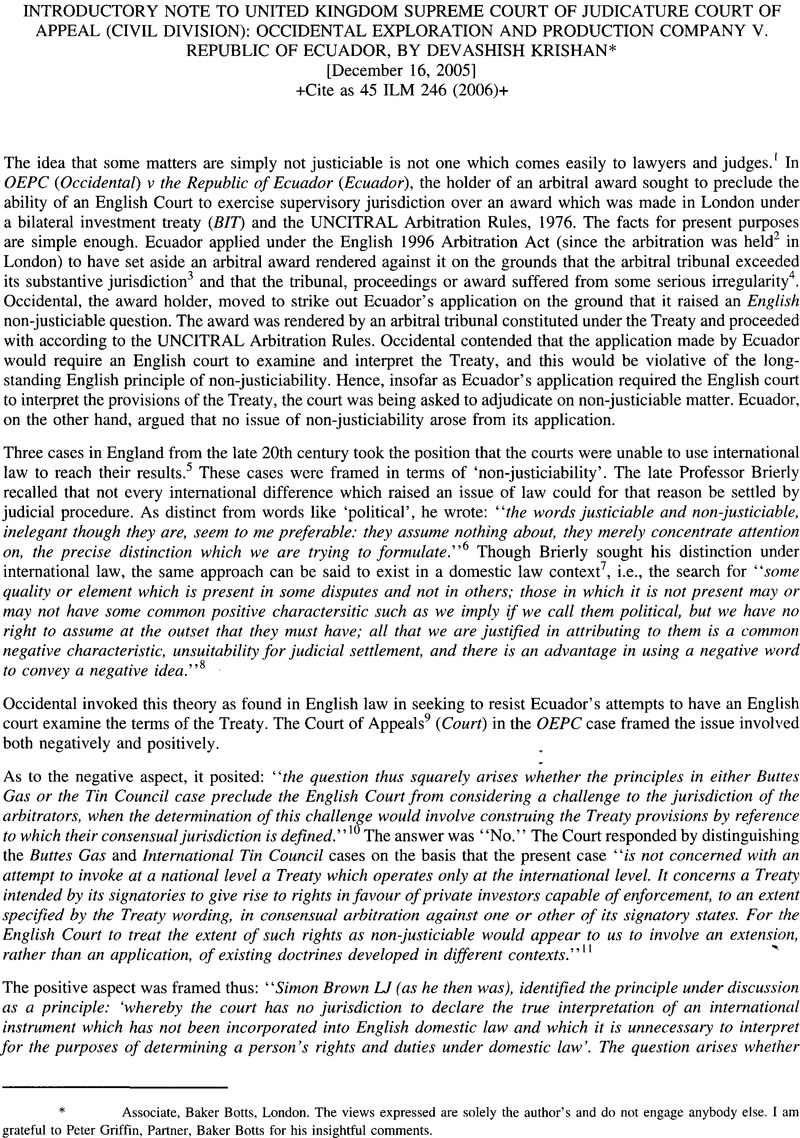Published online by Cambridge University Press: 27 February 2017

1 See the discussion in Lawrence Collins, “Foreign Relations and the Judiciary”(2002) 51ICLQ485, 497.
2 Article VI(5), Treaty between the United States of America and the Republic of Ecuador concerning the Encouragement and Reciprocal Protection of Investments(Treaty) states that an arbitration under the Treaty held according to the UNCIT-RAL Arbitration Rules, 1976 “shall be held in a state that is a party to the New York Convention.“).
3 Section 67, English Arbitration Act, 1996.
4 Section 68, English Arbitration Act, 1996.
5 These cases are the famedButtes Gas and Oil Co. v Hammer [1982] AC 888,931G; the International Tin Council litigation:JH Rayner (Mincing Lane) Ltd. vDepartment of Trade and Industry [1990] 2 AC 418; and the Arab Monetary Fund case:Arab Monetary FundvHashim (No 3) [1991] 2 AC 114. The ‘parochial approach’ applied in International Tin Council and Arab Monetary Fund have been criticised in the literature:see Sir Robert Jennings, 1989 FA Mann Lecture, (1990) 39ICLQ 513, 524-526; Dame Rosalyn Higgins,Problems and Processes, 1994, especially at 206-213; L. Collins,supra. note 2 at 497.
6 James Brierly, “The Judicial Settlement of International Disputes” 1925Journal of British Institute of International Affairs, reprinted in H. Lauterpacht and C.H.M. Waldock (eds.),The Basis of Obligation in International Law and Other Papers by the Late James Lesley Brierly, 1958, 93 at 96.
7 Brierly seems to have felt that the difficulties in identifying the test of justiciability under international law is not on account of some ‘immaturity’ of International Law, especially contrasted with municipal law since the ‘ ‘contrast between municipal law and international law which is at least very much exaggerated. Every system of law … is open … to these same charges of vagueness and containing lacunae …
8 Ibid, at 97.
9 The High Court,per Aikens J, had ruled against Occidental, who had appealed to the Court of Appeals, reported, [2005] EWHC 774 (Comm).
10 Judgment, para. 37.
11 Judgment, para. 37.
12 Judgment, para. 31.
13 Judgment, para. 31.
14 The Court did not seem enthusiastic about the principle: see Judgment, paras. 25 and 29.
15 Judgment, para. 32; also see para. 37 where the positive and negative aspects of the case are joined.
16 Judgment, para. 37.
17 Judgment, para. 41.
18 Judgment, para. 55.
19 Leading propositions of this view can be found in the writings of F.A. Mann,see Mann, F.A.,’ ‘Private Arbitration and Public Policy”, (1985) 4 C.J.Q. 257–267 Google Scholar; F.A. Mann, “Lex Facit Arbitrum”, in Pieter Sanders (ed.),International Arbitration-Liber Amicorum for Martin Domke, 1967, 157-183. Alsosee Clive Schmitthoff, ‘ ‘The Supervisory Jurisdiction of the English Courts”, in Pieter Sanders,Ibid, at 289-300. For alternate viewssee citations and discussion in Paulsson, Jan, “Arbitration Unbound: Award Detached from the Law of its Country of Origin'', (1981) 30 ICLQ 358–387,362-364CrossRefGoogle Scholar; Jakubowski, Jerzy, “Reflections on the philosophy of international commercial arbitration and conciliation”, in Schultsz, Jan C. and Van Den Berg, Albeit Jan (eds.), The Art of Arbitration, 1982, 175–188, 179Google Scholar; Mauro Ferante, “About the nature (national or a-national, contractual or jurisdictional) of ICC awards under the New York Convention”, in Schultsz and Van Den Berg (eds.),Ibid, at 129-141, 135, 137-141.
20 And therefore English courts can exercise supervisory powers under section 67 of the English 1996 Act. This provides the short answer to what the appeal concerned: see Judgment, para. 1.
21 It is submitted that it is worthy to further consider whether UNCITRAL - BIT awards may be said to be ‘stateless but not lawless'. Note the difference between setting aside jurisdiction and jurisdiction to recognise and enforce (Judgment, paras. 39, 53-55; De Ly, Filip, “The Place of Arbitration and Arbitration Planning: The Theoretical Framework” (1991) 12 AW. J. INT'L L.&BUS. 48 at 70-79Google Scholar; Van Den Berg, Albert Jan, “Non-Domestic Arbitral Awards under the 1958 New York Convention” (1986) 2 Arb. Int'l 191 at 197-199, 201, 206, 210-213CrossRefGoogle Scholar; Kaufman-Kohler, Gabrielle, “Globalization of Arbitral Procedure” (2003) 36 Vand. J. Tranat'l L 1313 at 1318-1320Google Scholar); the relationship in public international law between the obligation to arbitrate and the award (Article 18, 1899 Hague Convention on the Pacific Settlement of International Disputes; Article 37, 1907 Hague Convention on the Pacific Settlement of International Disputes; Article 13(4), Covenant of the League of Nations; Article 32(2) UNCITRAL Arbitration Rules, 1976; Fox, Hazel, “States and the Undertaking to Arbitrate” (1988) 37 ICLQ 1 at 6,8-9,22-24,29)CrossRefGoogle Scholar; the flexibility contained in the New York Convention (A.J. Van Den Berg,Ibid.; “territory” - Articles 1(1), 1(3), III; “country” -Articles IV(2), V(2), V(l)(a), V(l)(d), V(l)(e), VII; law applicable to arbitration agreement - Article V(l)(a); law of the country and award - Article V(l)(e); ‘domestic awards’ -Articles 1(1), III); the internationalist potential of the UNCITRAL Arbitration Rules, 1976 ('law applicable to arbitration’ -Rule 1; ‘place of arbitration’ - Rules 16, 32(4), 32(7); effect of award - Rule 32(2), particularly read with so-called ‘umbrella’ clauses; the word ‘territory’ does not seem to be used); the identification of rules of public international law applicable to an arbitration (H. Fox,Ibid.; Caron, David, “The Nature of the Iran-United States Claims Tribunal and the Evolving Structure of International Dispute Resolution'', (1990) 84 Am. J. Int'l L. 104, 111-113, 120-126CrossRefGoogle Scholar; P.F. Kunzlik, “Public International Law - Cannot Govern a Contract, Can Authorise an Arbitration”, [1986]C.L.J. 317; ICJ jurisprudence inQatar v Bahrain, Judgment of 16 March 2001, paras. 111-114, 139-146;Advisory Opinion of 9 March 1988 and 26 April 1988, I.C.J. Reports 1988, p. 12, 29, 43, 51-52, 54, 58-62;Guinea-Biassau v Senegal, Judgment of 31 July 1989, I.C.J. Reports 1991, p. 53); other possibilities to enforce ‘international’ awards under the common law as actions to enforce foreign judgments (Fox,Id. at 26-27) or by way of specific relief (Indian Specific Relief Act, 1963, section 25).
* This document was reproduced and reformatted from the text appearing at the BAILII website <http://www.bailii.org/ew/cases/EWCA/Civ/2005/1116.html> (visited December 9, 2005)